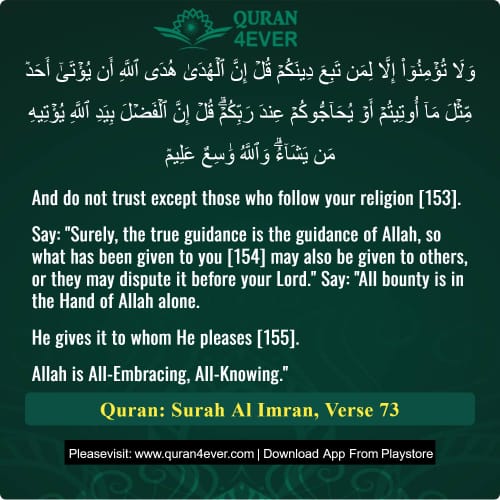
Transliteration:( Wa laa tu'minooo illaa liman tabi'a deenakum qul innal hudaa hudal laahi ai yu'taaa ahadum misla maaa ooteetum aw yuhaaajjookum 'inda Rabbikum, qul innal fadla biyadil laah; yu'teehi mai yashaaa'; wallaahu Waasi'un 'Aleem )
"And do not trust except those who follow your religion [153]. Say: 'Surely, the true guidance is the guidance of Allah, so what has been given to you [154] may also be given to others, or they may dispute it before your Lord.' Say: 'All bounty is in the Hand of Allah alone. He gives it to whom He pleases [155]. Allah is All-Embracing, All-Knowing.'"
This refers to the belief held by the Children of Israel that Prophethood was their exclusive right, and none outside their lineage—especially not the Children of Ismail (peace be upon him)—could be chosen.
The Jewish priests discouraged others from accepting Islam, arguing that the Prophet ﷺ did not belong to Bani Israel.
They would even pretend to accept Islam verbally, while in their hearts they considered it false.
This reveals the long-standing presence of hypocrisy and deception in their methods, as highlighted in Tafseer Naeemi.
The claim that only the Children of Israel were entitled to Prophethood is baseless. It is not supported by any revealed book.
The Qur’an refutes this by declaring:
“And We placed Prophethood and the Book among the descendants of Ibrahim (peace be upon him)” (Surah 29: Verse 27).
This confirms that Prophethood is not restricted to any one tribe but includes all descendants of Hazrat Ibrahim (peace be upon him), which includes Hazrat Ismail’s lineage—the lineage of our Holy Prophet ﷺ.
Therefore, we can clearly reject false claimants like Mirza Ghulam Ahmad Qadiyani, as he does not belong to that lineage.
Prophethood is not earned or inherited by merit alone.
Allah makes it clear: It is His bounty, and He grants it to whomever He wills.
The Children of Israel have no authority to restrict this blessing.
Hazrat Adam and Hazrat Isa (peace be upon them) were made Prophets from birth.
Likewise, sainthood (wilayah) is also a gift of Allah—it may be granted through deeds or purely through His mercy, like in the case of Hazrat Sayyidah Maryam (peace be upon her), who became a saint in her childhood without yet having performed deeds.
The tafsir of Surah Imran verse 73 by Ibn Kathir is unavailable here.
Please refer to Surah Imran ayat 69 which provides the complete commentary from verse 69 through 74.
(3:73) They also say among themselves: ‘Do not follow anyone except him who follows your faith.’ Say: ‘Surely true guidance is Allah’s. It is His favour that anyone should be given the like of what you have been given in the past, and that others should have been given firm evidence to proffer against you before your Lord.’ Say: ‘Surely bounty is in the Hand of Allah; He gives it to whom He wills. Allah is All-Embracing,[62] All-Knowing.[63]
62. The word wasi’ which is used here occurs in the Qur’an in three contexts. The first context is the narrow-mindedness and mean outlook of certain people, in contrast to which God is not ‘narrow’. The second context is the denunciation of miserliness, meanness and niggardliness, in contrast to which God is Generous and Munificent. The third context is the ascription of finite, limited concepts to God as a result of their limited imagination, whereas the truth is that God is infinite see (Surah Al-Baqarah, ayat 115) note 116
63. That is, God knows who deserves to be honoured and exalted.
[132]- See footnote to 2:19.

For a faster and smoother experience,
install our mobile app now.
Related Ayat(Verses)/Topics